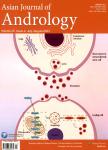Growth inhibition mediated by PSP94 or CRISP-3 is prostate cancer cell line specific
Growth inhibition mediated by PSP94 or CRISP-3 is prostate cancer cell line specific作者机构:Division of Structural Biology National Institute for Research in Reproductive Health Indian Council of Medical ResearchMumbai 400012 India
出 版 物:《Asian Journal of Andrology》 (亚洲男性学杂志(英文版))
年 卷 期:2010年第12卷第5期
页 面:677-689页
核心收录:
学科分类:12[管理学] 082803[工学-农业生物环境与能源工程] 07[理学] 08[工学] 09[农学] 071007[理学-遗传学] 090102[农学-作物遗传育种] 0710[理学-生物学] 1204[管理学-公共管理] 0828[工学-农业工程] 0901[农学-作物学] 0836[工学-生物工程] 120405[管理学-土地资源管理]
基 金:grants from the Indian Council of Medical Research
主 题:β-microseminoprotein CRISP-3 clonogenic survival assay LNCaP PC3 WPE1-NB26
摘 要:The prostate secretory protein of 94 amino acids (PSP94) has been shown to interact with cysteine-rich secretory protein 3 (CRISP-3) in human seminal plasma. Interestingly, PSP94 expression is redaced or lost in the majority of the prostate tumours, whereas CRISP-3 expression is upregulated in prostate cancer compared with normal prostate tissue. To obtain a better understanding of the individual roles these proteins have in prostate tumourigenesis and the functional relevance of their interaction, we ectopically expressed either PSP94 or CRISP-3 alone or PSP94 along with CRISP-3 in three prostate cell lines (PC3, WPE1-NB26 and LNCaP) and performed growth inhibition assays. Reverse transcription-polymerase chain reaction and Western blot analysis were used to screen prostate cell lines for PSP94 and CRISP-3 expression. Mammalian expression constructs for human PSP94 and CRISP-3 were also generated and the expression, localization and secretion of recombinant protein were assayed by transfection followed by Western blot analysis and immunofluorescence assay. The effect that ectopic expression of PSP94 or CRISP-3 had on cell growth was studied by clonogenic survival assay follokving transfection. To evaluate the effects of coexpression of the two proteins, stable clones of PC3 that expressed PSP94 were generated. They were subsequently transfected with a CRISP-3 expression construct and subjected to clonogenic survival assay. Our results showed that PSP94 and CRISP-3 could each induce growth inhibition in a cell line specific manner. Although the growth of CRISP-3-positive cell lines was inhibited by PSP94, growth inhibition mediated by CRISP-3 was not affected by the presence or absence of PSP94. This suggests that CRISP-3 may participate in PSP94-independent activities during prostate tumourigenesis.



